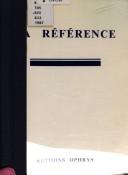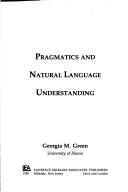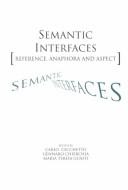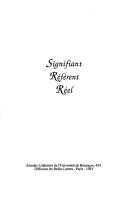| Listing 1 - 10 of 28 | << page >> |
Sort by
|
Book
Year: 2000 Publisher: Delachaux et Niestlé (programme ReLIRE)
Abstract | Keywords | Export | Availability | Bookmark
 Loading...
Loading...Choose an application
- Reference Manager
- EndNote
- RefWorks (Direct export to RefWorks)
Reference (Linguistics) --- Openings (Rhetoric) --- Référence (linguistique) --- Commencement (rhétorique) --- Balzac, Honoré de,

ISBN: 2708005766 9782708005761 Year: 1987 Publisher: [Paris]: Ophrys,
Abstract | Keywords | Export | Availability | Bookmark
 Loading...
Loading...Choose an application
- Reference Manager
- EndNote
- RefWorks (Direct export to RefWorks)
Reference (Linguistics) --- Reference (Philosophy) --- Référence (Linguistique) --- Référence (Philosophie) --- Congresses --- Congrès --- Référence (Linguistique) --- Référence (Philosophie) --- Congrès
Book
ISBN: 9027250502 1556193319 9781556193316 9789027250506 9789027282699 9027282692 9786613222060 6613222062 128322206X Year: 1996 Volume: n.s., 38 Publisher: Amsterdam ; Philadelphia : J. Benjamins,
Abstract | Keywords | Export | Availability | Bookmark
 Loading...
Loading...Choose an application
- Reference Manager
- EndNote
- RefWorks (Direct export to RefWorks)
The papers in this volume are concerned with the question of how a speaker's intended referent is interpreted by the addressee. Topics include the interpretation of coreferential vs. disjoint reference, the role of intonation, syntactic form and animacy in reference understanding, and the way in which general principles of utterance interpretation constrain possible interpretations of referring expressions. The collection arises from a workshop on reference and referent accessibility which was held at the 4th International Pragmatics Conference in Kobe, Japan, July 25-30, 1993.
Linguistics --- Pragmatics --- Reference (Linguistics) --- Référence (Linguistique) --- Congresses --- Congrès --- Language arts --- Signification (Linguistics) --- Onomasiology --- Semantics --- Reference (linguistique)

ISBN: 0898598532 Year: 1989 Publisher: Hillsdale, N.J. Erlbaum
Abstract | Keywords | Export | Availability | Bookmark
 Loading...
Loading...Choose an application
- Reference Manager
- EndNote
- RefWorks (Direct export to RefWorks)
Lexicology. Semantics --- Pragmatics --- Cognitive science --- Discourse analysis --- Reference (Linguistics) --- Semantics (Philosophy) --- Sciences cognitives --- Analyse du discours --- Pragmatique --- Référence (Linguistique) --- Sémantique (Philosophie) --- Référence (Linguistique) --- Sémantique (Philosophie)
Book
Year: 1999 Publisher: London : Longman,
Abstract | Keywords | Export | Availability | Bookmark
 Loading...
Loading...Choose an application
- Reference Manager
- EndNote
- RefWorks (Direct export to RefWorks)
Discourse analysis --- Context (Linguistics) --- Reference (Linguistics) --- Cognitive grammar --- Knowledge, Theory of --- Analyse du discours --- Contexte --- Référence (Linguistique) --- Grammaire cognitive --- Théorie de la connaissance
Book
ISBN: 9780198790358 019879035X 0191837024 Year: 2016 Publisher: Oxford Oxford University Press
Abstract | Keywords | Export | Availability | Bookmark
 Loading...
Loading...Choose an application
- Reference Manager
- EndNote
- RefWorks (Direct export to RefWorks)
Philosophy of language --- Language and languages --- Philosophy of mind. --- Reference (Linguistics) --- Reference (Philosophy) --- Thought and thinking. --- Pensée --- Référence (Philosophie) --- Référence (Linguistique) --- Langage et langues --- Philosophie de l'esprit --- Philosophy. --- Philosophie --- Pensée --- Référence (Philosophie) --- Référence (Linguistique)
Book
ISBN: 9782708015913 2708015915 Year: 2021 Publisher: Paris: Ophrys,
Abstract | Keywords | Export | Availability | Bookmark
 Loading...
Loading...Choose an application
- Reference Manager
- EndNote
- RefWorks (Direct export to RefWorks)
Qu'est-ce qui permet de comprendre qu'une suite d'expressions telle que Barack Obama... l'ex-président des USA... le mari de Michelle ... il désigne la même personne ? Par quels mécanismes linguistiques et cognitifs parvient-on à relier ces expressions ? Comment appréhender, suivre et mémoriser, le thème principal d'un discours écrit ou oral ? Comment introduire un référent dans un texte ? Avec quels outils grammaticaux et lexicaux peut-on en élaborer le " tracé " pour former un texte bien formé, cohésif et cohérent ? C'est à ces questions qu'entend répondre cet ouvrage à travers la notion de chaînes de référence, qui définit les séquences d'expressions renvoyant à une même entité.
French language --- Français (langue) --- Reference --- Référence (linguistique). --- Reference (Linguistics) --- Cohesion (Linguistics) --- Référence (linguistique) --- Langue d'oïl --- Romance languages --- 804.0-56 --- 804.0-56 Frans: syntaxis; semantiek --- Frans: syntaxis; semantiek
Book
ISBN: 9780199659999 9780199659982 0199659990 0199659982 0191635464 1299195830 0191745405 Year: 2012 Publisher: Oxford Oxford University Press
Abstract | Keywords | Export | Availability | Bookmark
 Loading...
Loading...Choose an application
- Reference Manager
- EndNote
- RefWorks (Direct export to RefWorks)
Francois Recanati presents his theory of mental files, a new way of understanding reference in language and thought. He aims to recast the 'nondescriptivist' approach to reference that has dominated the philosophy of language and mind in the late twentieth century. According to Recanati, we refer through mental files, which play the role of so-called 'modes of presentation'. The reference of linguistic expressions is inherited from that of the files we associate with them. The reference of a file is determined relationally, not satisfactionally: so a file is not to be equated to the body of (mis)information it contains. Files are like singular terms in the language of thought, with a nondescriptivist semantics.In contrast to other philosophers, Recanati offers an indexical model according to which files are typed by their function, which is to store information derived through certain types of relation to objects in the environment. The type of the file corresponds to the type of contextual relation it exploits. Even detached files or 'encyclopedia entries' are based on epistemically rewarding relations to their referent, on Recanati's account. Among the topics discussed in this wide-ranging book are: acquaintance relations and singular thought; cognitive significance; the vehicle/content distinction; the nature of indexical concepts; co-reference de jure and judgments of identity; cognitive dynamics; recognitional and perceptual concepts; confused thought and the transparency requirement on modes of presentation; descriptive names and 'acquaintanceless' singular thought; the communication of indexical thoughts; two-dimensional defences of Descriptivism; the Generality Constraint; attitude ascriptions and the 'vicarious' use of mental files; first-person thinking; token-reflexivity in language and thought.
Philosophy of language --- Thought and thinking. --- Reference (Philosophy). --- Reference (Linguistics). --- Language and languages --- Philosophy of mind. --- Pensée --- Référence (Philosophie) --- Référence (Linguistique) --- Langage et langues --- Philosophie de l'esprit --- Philosophy. --- Philosophie --- Pensée --- Référence (Philosophie) --- Référence (Linguistique) --- Memory.

ISBN: 1575863162 1575863154 Year: 2001 Publisher: Stanford, Calif. CSLI
Abstract | Keywords | Export | Availability | Bookmark
 Loading...
Loading...Choose an application
- Reference Manager
- EndNote
- RefWorks (Direct export to RefWorks)
Lexicology. Semantics --- Grammar --- Semantics. --- Reference (Linguistics) --- Grammar, Comparative and general --- Sémantique --- Référence (Linguistique) --- Aspect (Linguistique) --- Temps (Linguistique) --- Aspect. --- Tense. --- Reference (Linguistics). --- Sémantique --- Référence (Linguistique) --- Semantics --- Formal semantics --- Semasiology --- Semiology (Semantics) --- Comparative linguistics --- Information theory --- Language and languages --- Lexicology --- Meaning (Psychology) --- Signification (Linguistics) --- Linguistics --- Onomasiology --- Tense (Grammar) --- Aspect (Linguistics) --- Aspect --- Tense --- Temporal constructions --- Verbal aspect --- Verb --- Philology

ISBN: 2251604553 9782251604558 Year: 1992 Volume: 455 20 Publisher: Paris : Belles Lettres,
Abstract | Keywords | Export | Availability | Bookmark
 Loading...
Loading...Choose an application
- Reference Manager
- EndNote
- RefWorks (Direct export to RefWorks)
Reference (Linguistics) --- Semiotics --- Signs and symbols --- Référence (Linguistique) --- Sémiotique --- Signes et symboles --- Congresses --- Congrès --- Congresses. --- -Semiotics --- -Signs and symbols --- -Representation, Symbolic --- Semeiotics --- Signs --- Symbolic representation --- Symbols --- Abbreviations --- Omens --- Sign language --- Symbolism --- Visual communication --- Semiology (Linguistics) --- Semantics --- Structuralism (Literary analysis) --- Signification (Linguistics) --- Linguistics --- Onomasiology --- -Congresses --- Référence (Linguistique) --- Sémiotique --- Congrès --- Linguistique --- Signifiant --- Realite --- Semiologie
| Listing 1 - 10 of 28 | << page >> |
Sort by
|

 Search
Search Feedback
Feedback About UniCat
About UniCat  Help
Help News
News